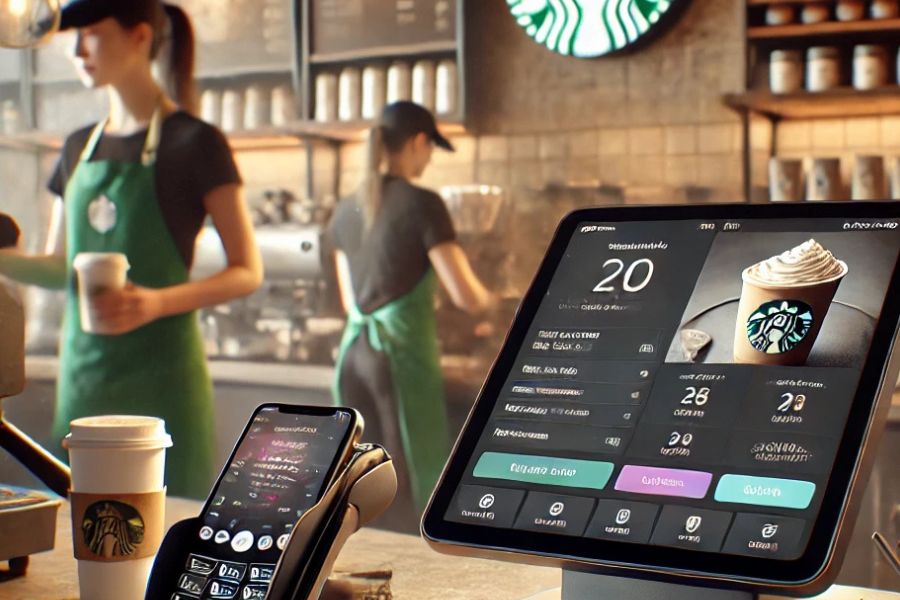Did you know that integrating your point of sale system with ecommerce can transform how you manage orders across multiple channels? This solution bridges the gap between online and offline operations, offering seamless transaction handling while reducing manual tasks. Businesses leveraging point of sale ecommerce integrations often see smoother order management and fewer errors, ultimately improving efficiency and customer satisfaction.
In this blog, we’ll explore the top point of sale ecommerce integrations your online store can’t afford to miss. Tips for choosing the right system to meet your specific needs will also be provided, regardless of your business size.
Highlights
- POS eecommerce integrations bridge in-store and online operations, syncing sales, inventory, and customer data for streamlined business management.
- For seamless operations, effective POS ecommerce integrations should provide real-time inventory updates, multi-channel sales support, and clear reporting to guide smarter decision-making.
What Is Point Of Sale ecommerce Integration?
The global e-commerce market is expected to be worth $6.3 trillion this year – up from $5.8 trillion in 2023, reflecting the increasing demand for seamless shopping experiences across all channels.

Point of sale ecommerce integration is key to this shift, linking your physical store checkouts with online platforms for real-time data synchronization. When an item sells online or in-store, inventory updates instantly across all channels, preventing overselling and ensuring accurate stock levels.
This integration means businesses can effectively maintain consistent records and offer a unified shopping experience. It also streamlines reporting by consolidating sales data from both physical and online transactions, making it easier to analyze performance and drive informed decisions.
How to Integrate POS with an ecommerce Platform?
Integrating your POS system with an ecommerce website involves several approaches. Yet, the best approach depends on what systems you already have in place. Here’s how to tackle it based on your situation:
- You Have a POS but Not a Website
If you already use a POS system, you can connect it to ecommerce platforms that support open APIs. Reach out to your POS provider to explore integration options or activate its built-in ecommerce features. Decide if you will continue with your current provider or switch to another POS system.
Integration Steps:
- Choose a Theme: Pick a design for your website, whether using a preloaded template or a custom-built option.
- Synchronize Payment Gateway: Connect your POS system’s payment gateway with your online platform, noting that online transaction fees may differ from in-store rates.
- Import Customer Data and Inventory: Use migration tools to accurately transfer loyalty points, customer data, and inventory.
- Set Up Shipping: Ensure your platform integrates with your preferred shipping providers for a smooth fulfillment process.
- You Have a Website but Not a POS
For businesses starting online and looking to expand into physical stores, point of sale ecommerce integration is mỏe straightforward. Make sure the POS you choose aligns with your existing website setup.
Integration Steps:
- Payment Processor Integration: Confirm that the POS can connect with your current payment processors to avoid disruption.
- Inventory Tracking and Add-Ons: Choose a POS system that offers inventory management, reporting, and additional features relevant to your business.
- Curbside Pickup: Opt for a POS that supports curbside pickup, a service that remains popular post-pandemic.
- You Have Neither a POS nor a Website
If starting from scratch sure will take time, on the other hand, it’s also a change to build a fully integrated system.
- Research All-in-One Solutions: Look for a POS system that integrates with an ecommerce platform for a direct connection between the two channels.
- Choose a POS System with ecommerce Capabilities: A Magento-native POS can be a good option. Partnering with a technical solutions provider can also help guide you through the setup, ensuring you get the right tools without unnecessary add-ons.
The Top 9 Point of Sale ecommerce Integrations for Retail
ConnectPOS
ConnectPOS is a leading POS system that offers smooth ecommerce integration, helping businesses unify their offline and online sales channels. Below are main features and benefits of using ConnectPOS for point of sale ecommerce integration:
- Omnichannel Experience: ConnectPOS provides a consistent shopping experience across brick-and-mortar, online stores, and mobile apps. Customers can switch between sales channels effortlessly, enhancing overall satisfaction.
- Real-Time Inventory Management:With accurate, real-time inventory tracking, businesses can avoid stockouts and overstocking. This feature ensures that stock levels stay consistent across all channels, optimizing your inventory control.
- Streamlined Order Processing: ConnectPOS integrates online and offline orders for efficient fulfillment, minimizing manual errors and speeding up order processing.
- Multi-Platform Compatibility: ConnectPOS is compatible with popular ecommerce platforms like BigCommerce, Magento, Shopify, and WooCommerce, offering businesses flexibility without sacrificing a unified sales system.
- Customizable Receipts and Promotions:Businesses can personalize receipts with branding and special promotions, enhancing the shopping experience and enabling targeted marketing campaigns.
- Comprehensive Reporting and Analytics: ConnectPOS provides detailed reports and analytics on sales performance, customer behavior, and inventory trends. This data-driven approach helps businesses make informed decisions and optimize their sales strategies.
- Secure Payment Processing: The system supports a variety of payment methods, including credit cards, mobile payments, and online payments, with advanced security solutions.
- Customer Loyalty Programs: The system allows easy integration of loyalty programs, rewarding repeat customers with points, discounts, or personalized promotions, which helps build long-term customer loyalty.
Pricing Plans:
- Standard Plan: Starts at $49 per month
- Advanced Plan: $79 per month
These plans come with various features, including real-time inventory management, omnichannel support, customizable receipts, and more.
Shopify POS
Shopify POS is a popular choice for both online and brick-and-mortar stores, with over 365,000 users globally.
It seamlessly connects all sales channels, allowing businesses to manage transactions and inventory from a single dashboard. Real-time inventory updates ensure that when a product is sold in-store, it automatically adjusts across all platforms, including the online store.
Key Features:
- Omnichannel selling: Synchronizes your online and offline stores for a seamless shopping experience across all sales channels.
- Payment processing: Accepts various payment methods, including credit cards, Apple Pay, and Google Pay, ensuring smooth checkout processes.
- Staff management: Allows you to track employee performance, manage shifts, and control staff permissions, ensuring operations run efficiently.
- POS inventory management: Offers real-time tracking of stock levels to prevent overselling and ensure popular items remain available.
- Customization: Personalize the checkout process, receipts, and customer interactions to align with your brand identity.
Pricing: Starts at $19/month.
Lightspeed POS
Lightspeed is favored across retail, hospitality, and restaurant sectors due to its ability to handle complex product catalogs.
It allows users to track products by size, color, and material, while also supporting bulk uploads. The system offers various reports, including sales by product, employee performance, and profit margins. Lightspeed excels in managing multiple locations, transferring stock, and consolidating reports for multi-location businesses.
Key Features:
- Multi-channel sales management: Manages in-store and online sales from a unified platform, creating a seamless retail experience.
- Multi-location functionality: Easily transfers stock between locations and manages inventory across multiple stores.
- Robust inventory management: Tracks products by variations like size, color, or material, ensuring a detailed view of stock levels.
- Reporting and analytics: Generates detailed reports on sales, profit margins, and employee performance for informed business decisions.
- Marketing and loyalty tools: Offers tools to run targeted marketing campaigns and reward repeat customers through loyalty programs.
- Third-party integrations: Connects with external software like accounting, CRM, and more to streamline operations.
Pricing: Starts at $89/month.
Clover POS
Clover POS is adaptable to a range of industries, including retail, restaurants, and service sectors.
It offers real-time inventory tracking, allowing users to manage product variations like size and color easily. Clover also integrates with third-party apps, including accounting, CRM, and marketing tools, offering reports on stock levels, inventory movement, and product performance.
Key Features:
- Multi-channel sales management: Manages in-store and online sales from a unified platform, creating a seamless retail experience.
- Multi-location functionality: Easily transfers stock between locations and manages inventory across multiple stores.
- Robust inventory management: Tracks products by variations like size, color, or material, ensuring a detailed view of stock levels.
- Reporting and analytics: Generates detailed reports on sales, profit margins, and employee performance for informed business decisions.
- Marketing and loyalty tools: Offers tools to run targeted marketing campaigns and reward repeat customers through loyalty programs.
- Third-party integrations: Connects with external software like accounting, CRM, and more to streamline operations.
Pricing: Starts at $165/month.
Square POS
Square POS provides seamless eCommerce integration with support for multiple payment methods, including credit cards, debit cards, and mobile payments such as Apple Pay and Google Pay.
It offers comprehensive sales reports and inventory management features. With support for online and in-store transactions, Square makes managing your business from anywhere straightforward.
Key Features:
- Online ordering: Integrates with your website to accept online orders while syncing with your physical store.
- Loyalty program integration: Enables you to set up and manage customer loyalty programs, rewarding repeat shoppers.
- Marketing tools: Offers built-in email marketing features to send promotions, product updates, and more to your customers.
- Versatile payment processing options: Accepts various payment types, including contactless, mobile wallets, and traditional credit card payments.
Pricing: Free version available, with fees for sales. Advanced features start at $29/month.
Toast POS
Toast POS is designed specifically for the food service industry but can cater to a variety of food-related businesses, including restaurants, cafes, bakeries, and bars.
Toast POS offers real-time inventory tracking and customizable menus. It supports multi-location management and integrates with various third-party tools to optimize business operations.
Key Features:
- Real-time inventory management: Track stock levels and automatically update inventory when ingredients or items are used or sold.
- Customizable email marketing: Tailor promotions and communications to engage with customers based on their purchase history.
- Multi-location management: Manage multiple branches from one platform, keeping track of inventory, sales, and staff at different sites.
- Kitchen display system integration: Streamlines order processing between the front-of-house and kitchen, improving efficiency.
- Flexible payment processing: Supports payments via credit cards, mobile wallets, and contactless methods for faster transactions.
Pricing: Starts at $69/month
Korona POS
Korona POS delivers comprehensive inventory management capabilities. Users can upload existing product databases, create promotions, and manage inventory. The system offers extensive customization, cloud reporting, multi-location synchronization, and third-party integrations. Additionally, Korona POS includes a built-in loyalty system.
Key Elements of Korona POS:
- Real-time inventory management: Track stock levels and automatically update inventory when ingredients or items are used or sold.
- Customizable email marketing: Tailor promotions and communications to engage with customers based on their purchase history.
- Multi-location management: Manage multiple branches from one platform, keeping track of inventory, sales, and staff at different sites.
- Kitchen display system integration: Streamlines order processing between the front-of-house and kitchen, improving efficiency.
- Flexible payment processing: Supports payments via credit cards, mobile wallets, and contactless methods for faster transactions.
Pricing: Starts at $59/month.
ePOS Now
This cloud-based point of sale ecommerce integration features an easy-to-use interface and provides real-time data access from any device with internet connectivity. Users can track business performance, sales trends, and inventory levels. ePOS Now offers customization to meet specific business requirements.
Key Features of ePOS Now System:
- Intuitive retail POS: Easy-to-use interface for managing day-to-day sales operations in physical stores and online.
- Real-time inventory monitoring: Access stock data in real-time, ensuring accurate product availability.
- Detailed reporting tools: Generate custom reports to track business performance, sales trends, and inventory levels.
- Flexible payment processing: Supports various payment methods, including contactless and mobile payments.
- Multi-store management capabilities: Manage several store locations from one centralized platform, streamlining operations.
Pricing: $299/month
Stax Pay
Stax Pay allows for the automatic creation and sending of invoices to customers. It provides detailed sales reports and insights. The system is customizable, adapting to new features and settings as the business grows.
Key Features:
- Intuitive retail POS: Easy-to-use interface for managing day-to-day sales operations in physical stores and online.
- Real-time inventory monitoring: Access stock data in real-time, ensuring accurate product availability.
- Detailed reporting tools: Generate custom reports to track business performance, sales trends, and inventory levels.
- Flexible payment processing: Supports various payment methods, including contactless and mobile payments.
- Multi-store management capabilities: Manage several store locations from one centralized platform, streamlining operations.
Pricing: Starts at $99/month.
FAQs: Point of Sale Ecommerce Integration
1. Why is it important to integrate POS with ecommerce?
Integrating POS with ecommerce enables real-time inventory updates, accurate sales reporting, and improved customer experiences. This integration helps eliminate discrepancies between online and offline sales, enhancing overall efficiency.
2. Which POS systems are commonly used for ecommerce integration?
Popular POS systems for ecommerce integration include Shopify POS, Lightspeed, Clover, Square, Toast, Korona, and ePOS Now. Each system offers unique features catering to various business needs.
3. How do I choose the right point of sale ecommerce integration?
Consider factors such as compatibility with your existing ecommerce platform, features (like inventory management and reporting), payment processing options, and customer support. It’s also helpful to read reviews and compare pricing plans.
- What are the common challenges in POS and ecommerce integration?
Challenges may include data migration issues, compatibility between systems, and ensuring that payment gateways are synchronized. It’s important to have a clear integration plan to address these potential hurdles.
Conclusion
We’ve explored some of the top point of sale eCommerce integrations, focusing on how they can streamline both online and in-store operations. By understanding the integration options and key features of a strong POS system, you’re now better equipped to choose the right solution for your business.
As you evaluate your options, consider how a platform like ConnectPOS can support your growth. With its flexible features and seamless integration across all sales channels, it empowers your business to deliver an exceptional customer experience. Ready to optimize your operations? Contact ConnectPOS today and discover how it can elevate your store’s performance.
ConnectPOS is a all-in-one point of sale solution tailored to meet your eCommerce POS needs, streamline business operations, boost sales, and enhance customer experience in diverse industries. We offer custom POS with features, pricing, and plans to suit your unique business requirements.




